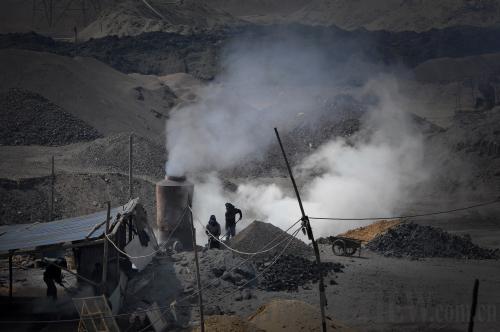|
 |
|
POISONING THE EARTH: People work busily at an illegal rare earth mining factory near Xinguang Village of Baotou, Inner Mongolia Autonomous Region. They discarded mineral waste without any disposal, which seriously polluted the surrounding environment (XINHUA) |
China is the world's largest producer and exporter of rare earth, accounting for 95 percent of the global output but having only 36 percent of global reserves, according to the MIIT.
Spurred by surging international market demand, illegal mining and smuggling operations rampant in the rare earth sector have caused the price of the valuable resources to plunge. From 1990 to 2005, China's rare earth exports increased 10 fold, but prices nose-dived 50 percent.
"China's regulation of the rare earth sector is totally consistent with WTO rules," said Gao. "China treats domestic and foreign companies equally, and the price of rare earth should be adjusted by the market. China has synchronized management and regulation in all links, from exploitation to processing and finally to export."
WTO's expert panel is designed to avoid unfair competition caused by trade distortions, said Ma Yu, Director of the FDI Department of the Chinese Academy of International Trade and Economic Cooperation under the MOFCOM.
"If China only has restriction on exports and foreign consumers have to pay a different price compared with domestic consumers, it is distorting the trade. But China has implemented restrictive measures in all links, from rare earth exploration and processing to exports. Those measures will have the same impact on both domestic and foreign buyers. For the same product, they pay the same price. This doesn't violate WTO rules because we have never twisted trade," said Ma.
China's stance
Four measures will be taken to clear polluted areas around China. First, environmental requirements will be implemented in production, processing and exports and optimized entry criteria in rare earth exploitation established. Second, the environment protection standard will be enhanced and any company that fails to meet those standards within a required period of time will be shut down. Third, an overall environment check will be conducted. Up to now, a list of 56 qualified rare earth production companies has been released. Finally, more advanced production technology will be adopted to continuously improve the whole sector's production level, according to Su.
China will continue its rare earth supply to the world when intensifying efforts in resource and environmental protection. China also hopes other countries with rare earth resources shoulder their due responsibility in global rare earth supplies, said Su.
"Opening up the rare earth sector is the existing policy. We will follow a win-win strategy of maintaining a reasonable amount of rare earth supply to the international market, while at the same time protecting the environment and resources," said Su.
| 